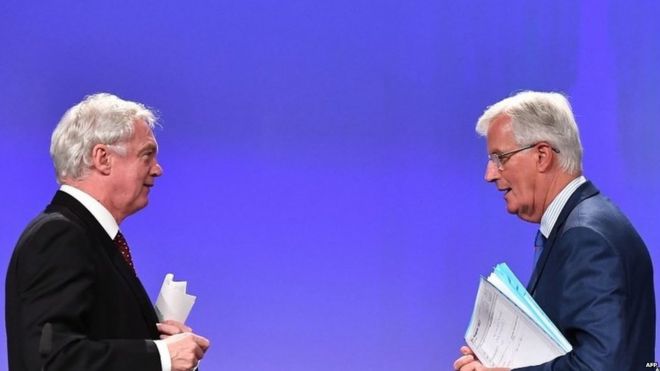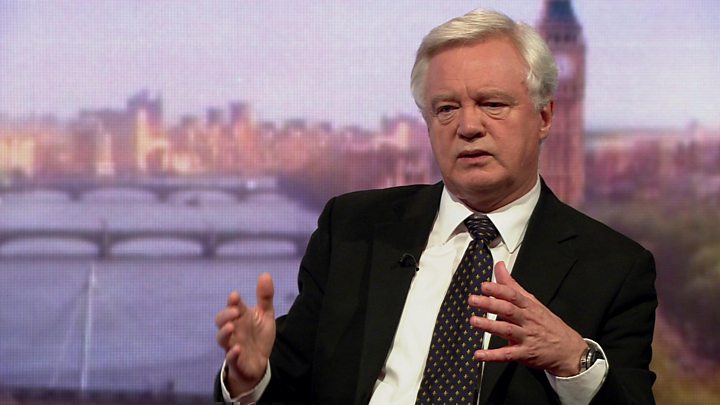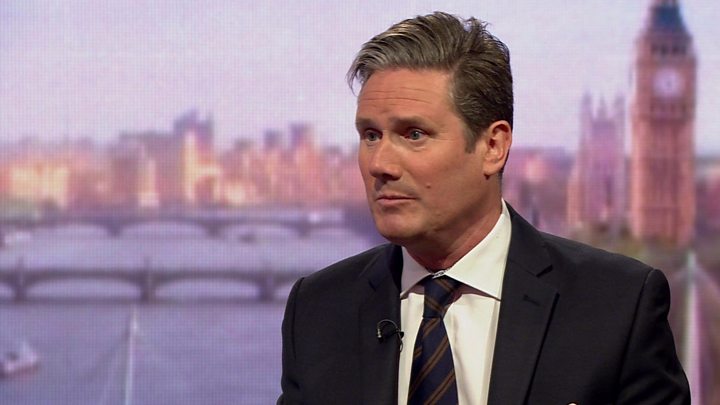 AFP
AFPThe EU's Brexit negotiator has said he sees the process as an opportunity to "teach the British people and others what leaving the EU means".
Michel Barnier said he would never resort to blackmail but saw it as his job to "educate" the UK about the price it would pay for leaving the EU "club".
The UK has hit back, saying the EU does "not want to talk about the future".
Brexit Secretary David Davis said it was "frightened" and the UK would not be bounced into a divorce bill deal.
The latest salvos come after a week of talks in Brussels about the UK's withdrawal from the EU - scheduled to take place in March 2019 - which increased tensions between the two sides.
The EU suggested little substantive progress had been made on three key "separation" issues, the size of the UK's financial liabilities to the EU, the future of the Irish border and citizens' rights after Brexit.
Mr Barnier accused the UK of "nostalgia" and cast doubt on whether enough progress had been made to broaden the discussions, in the autumn, to consider the UK's post-Brexit trading relationship with the EU.
This led to a frosty response from British ministers, one of whom, International Trade Secretary Liam Fox, said the UK would not be blackmailed into doing a deal on money in order to open discussions on trade.
'Serious consequences'
Speaking at a conference in Italy on Saturday, Mr Barnier said he did not want to punish the UK for leaving but said Brexit would be "an educational process" for the British.
"I have a state of mind - not aggressive... but I'm not naïve," he told the Ambrosetti forum.

"There are extremely serious consequences of leaving the single market and it hasn't been explained to the British people. We intend to teach people… what leaving the single market means."
On the issue of finance, he said the UK must accept some key principles, such as honouring the commitment it made in 2014 to pay 14% of the EU budget until 2020
He said that a future free trade deal would be different to all others in the past and there had to be assurances there would be no unfair competition in the form of social, environmental or fiscal dumping, or state aid.
But speaking to BBC One's Andrew Marr Show, Mr Davis insisted the UK would not be pressured into agreeing an EU divorce bill until it is sure the sums being demanded are fair.
He dismissed newspaper reports the UK had secretly agreed to pay a figure of up to £50bn as "nonsense".
The UK was assessing the EU's financial demands on an item-by-item basis in a "very British and pragmatic fashion" - which he said the EU found difficult.
'Silly'
While Mr Davis said he personally liked his counterpart, he said the European Commission risked making itself appear "silly" when it claimed no progress had been made in areas such as access to welfare and healthcare rights across Europe for British expats.
"What he's concerned about of course is he's not getting the answer on money… they've set this up to try and create pressure on us on money… they're trying to play time against money".
He added: "We're going through [the bill] line by line, and they're finding it difficult because we've got good lawyers… He wants to put pressure on us, which is why the stance this week in the press conference. Bluntly, I think it looked a bit silly, because plainly there were things that we've achieved.

"We put people before process, what they're in danger of doing is putting process before people".
Foreign Secretary Boris Johnson said some of the figures touted for the size of the divorce bill were "extravagant" and the UK would only respect a number that was "serious and validated in law".
"We will certainly honour our legal obligations as we understand them," he said, while stressing the UK would "certainly not pay for access to the European markets".
'Grown-up politics'
The continuing tit-for-tat between the two sides comes as Downing Street called for unity among its MPs as they prepare to debate the government's flagship Brexit bill.
The EU Withdrawal Bill will repeal the law that paved the way for the UK to join the European Economic Community in the 1970s and convert 40 years worth of EU statutes into domestic law.
Labour has said it will seek to amend the bill to stop the government from automatically accruing new powers after Brexit.
The opposition is courting europhile Conservative MPs, claiming its position on remaining in the single market and customs union during any Brexit transition is more "clear and coherent" than the Tories.
"To suggest, as some do, that you can have, as it were, bespoke, special arrangements negotiated between now and March 2019 is nonsense, and so this is grown-up politics from the Labour party in the public interest," shadow Brexit secretary Sir Keir Starmer told Andrew Marr.
But Mr Davis said Labour was onto its "perhaps seventh, eighth, ninth" policy on Brexit and the opposition knew the legislation was essential to ensuring legal certainty and practical continuity as the UK takes responsibility for policy in a wide range of areas.


No comments:
Post a Comment